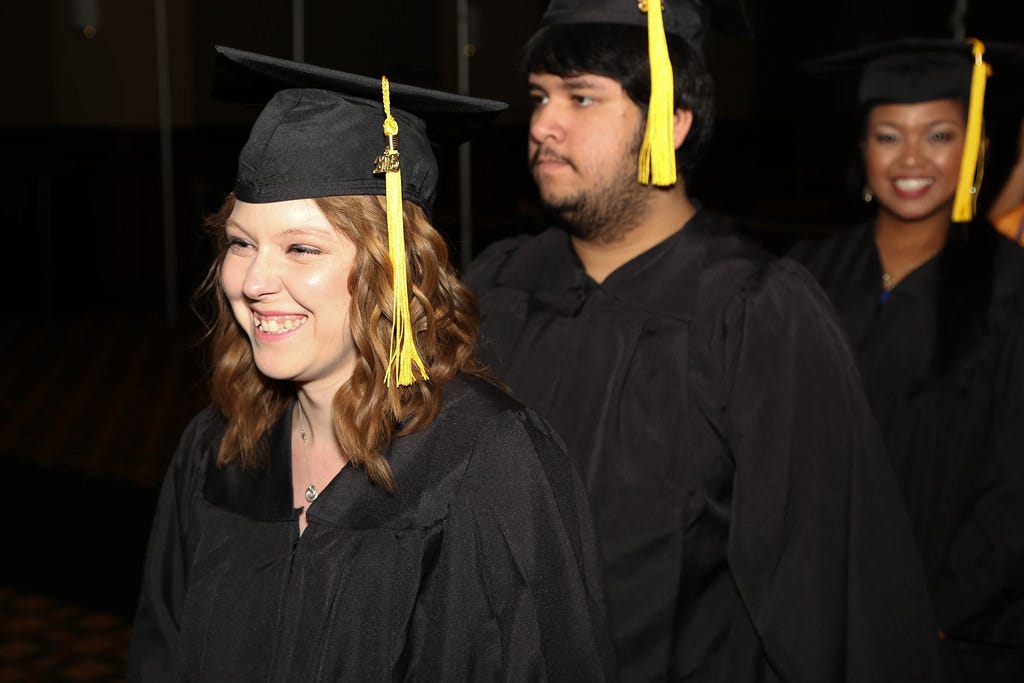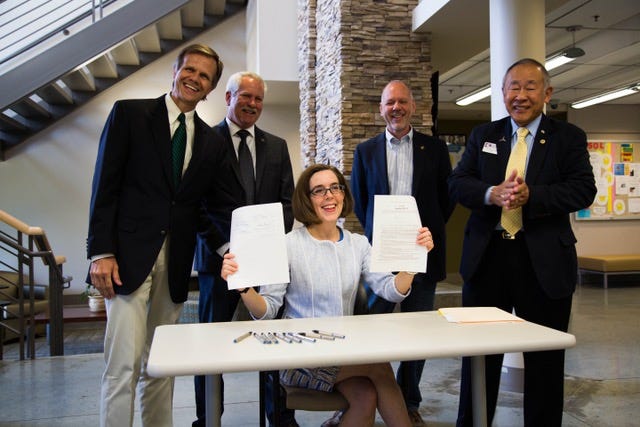Mark Hass: Time for Nationwide Free Community College
It would be hard to find a policy that could better unify and heal our country.
Mark Hass is a former Oregon State Senator.
The bright young Latina nervously and excitedly told me her hopes to become a dental hygienist. The event was a 2017 orientation for Oregon Promise students at Portland Community College. “I never dreamed college was in my future,” she said.
“Without this, I’d be cleaning houses like my mom.”

The Oregon Promise provides free community college tuition for Oregon high school graduates.
Oregon and Tennessee were the first two states to make community college free. Where these states led, hundreds of local jurisdictions followed. Within the last five years, communities from Lake Tahoe, California to Hartford, Connecticut have partnered with local community colleges to waive tuition.
Now, the policy has the potential to go national. The Biden administration is pushing to make free community college a federal policy. It should be — for the same reasons that brought red Tennessee, blue Oregon, and hundreds of communities in between to the same place.
It would be hard to find a policy that could better unify and heal our country.
Free community college represents a major policy choice that appeals to people from all political stripes in every region of the US. But it’s more than just popular, it’s also effective and responsive to a critical need in our nation.
For generations, Americans could walk out of high school and into a factory and make a decent living with only a high school education. Those jobs have been replaced by technology and global competition. Today’s jobs require education and skills beyond high school.
In Oregon, rural legislators lamented the closure of timber mills and the loss of opportunity for their young people. In urban Portland, the dynamics were different, but the problem was the same for young people priced out of post-secondary education. It was a problem that connected communities. The Oregon Promise passed overwhelmingly in 2015 without controversy or political drama.
Not surprisingly, these programs have become wildly popular, especially among the 30 percent of students who are the first in their families to attend college. Parents can now explain to their children that, if they work hard and stay in school, they can go to college someday. Rarely do government actions instill such hope and dreams.
Importantly, access to community college does more than empower individuals, it also fortifies communities. Ninety percent of Americans live within 25 miles of a community college. There’s a good chance they attended or have relatives who attended their local community college. These institutions can and do bring communities together. Polls consistently show people love community colleges. The same is not true for universities, sometimes characterized as elitist or snobbish.
There will be challenges. Progressives want all colleges and universities to be tuition free. Others want massive student loan forgiveness. Both well-meaning ideas carry loaded political baggage. By contrast, free community college is widely viewed as a down-to-earth approach that offers young people a genuine path to the middle class.
That path need not be four-year education at an exorbitantly expensive institution. Community college programs can connect students to the careers of the future in less time and at lower expense. Our country needs more welders, diesel mechanics, paramedics and trained experts in hundreds of other vocations. We want more students to get a head start on a four-year degree without taking on debt.
I recently ran into that PCC graduate, who just started her career as a dental hygienist. But she was most excited that her younger sister enrolled in the Oregon Promise and has also decided to enter the dental hygienist program.
Then she paused and said, “But she won’t be able to say she was the first person in her family to go to college. That was me.”
********************************************
Send feedback to Mark:
@MarkHassOregon
Keep the conversation going:
Facebook (facebook.com/oregonway)
Twitter (@the_oregon_way)
Check out our podcast:






A great move for Oregon to implement this. However, it is only a step and leaves out a huge population in even moreneed. As it is right now, the richest 18 year old in Oregon benefits from Oregon Promise and our tax dollars, but a hard-working struggling 28- (or 38- or 48- or 58-) year-old trying to turn their life around does not. Community college are so critical to those older adults in need of training and new careers - let's do the right thing and take this a step further. (And it's Columbia Gorge Community College)
Well said Senator. It's important to make the distinction between making all post secondary education free, eliminating student debt with the stroke of a pen, and the Oregon Promise. I would also add that making CC accessible for all students should mean just that and not be subject to the eligibility narrowing that has occurred in Oregon since the Oregon Promise was first passed. And great picture!